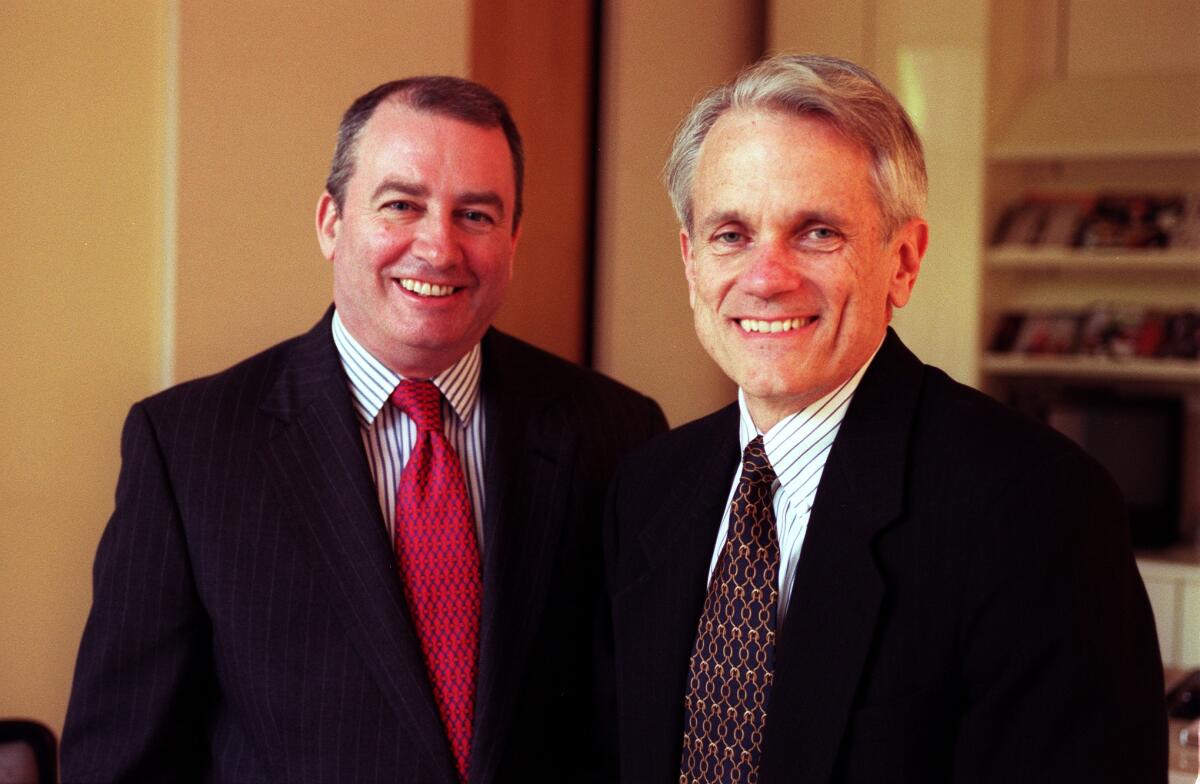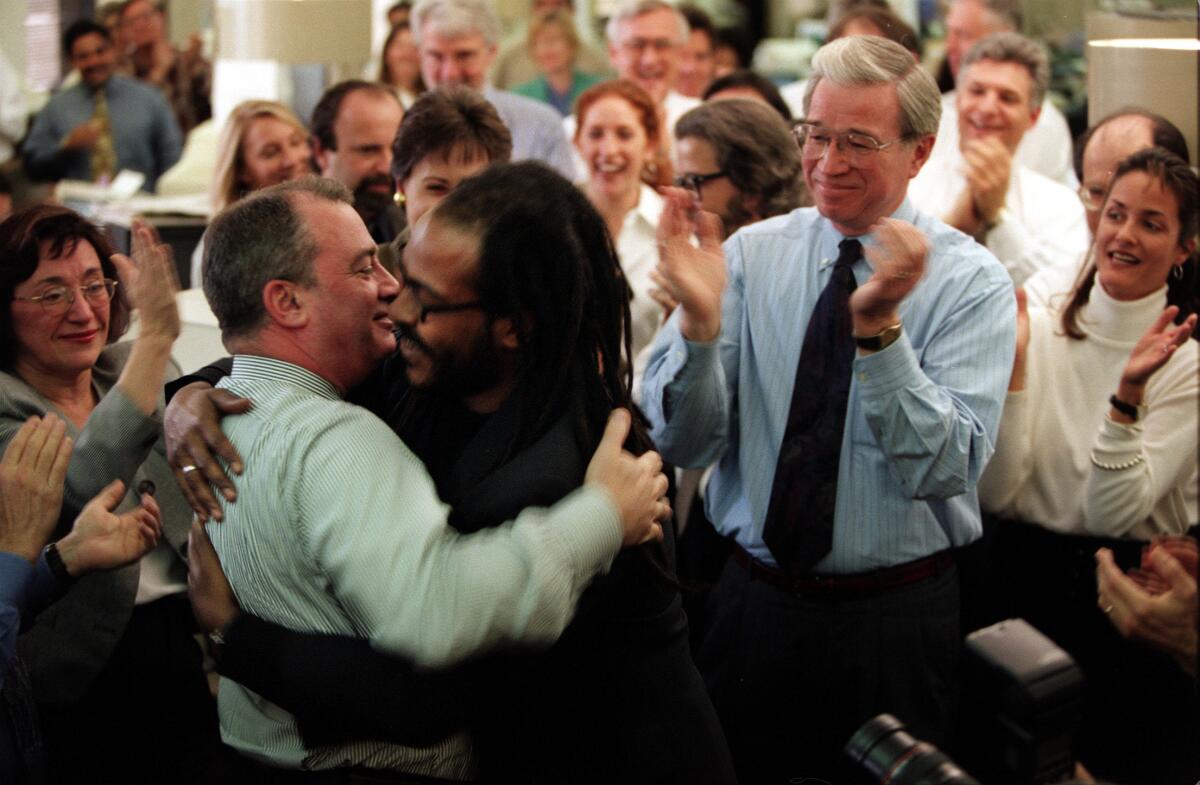Michael Parks, former Los Angeles Times editor and foreign correspondent, dies

- Share via
Michael Parks, who won a Pulitzer Prize for his reporting on the struggle to end apartheid in South Africa and later led the Los Angeles Times during a tumultuous period that ended when the Chandler family sold the newspaper after a century of control, died on Saturday. He was 78.
In his 25 years as a foreign correspondent, first for the Baltimore Sun and then for The Times, Parks covered some of the most momentous events in modern history, including the Vietnam War and the collapse of the Soviet Union.
After nearly three years as top editor at The Times, he taught at USC’s Annenberg School for Communication and Journalism for 20 years and served two stints as director of its journalism school.
Parks died of kidney failure and a heart attack at Huntington Hospital in Pasadena late Saturday after suddenly falling ill at home before dawn, according to his son, Christopher Parks.
From 1980 to 1995, Parks worked as The Times’ bureau chief in Beijing, Johannesburg, Moscow and Jerusalem. Erudite, with a powerful work ethic, he was known as an exceedingly prolific writer. After short runs as deputy foreign editor and managing editor, he was named editor of The Times in 1997.
His appointment came at a difficult time in the newspaper’s history. Once known for massive profits, The Times — like other papers — was starting to face financial struggles that led to budget cuts and changes in senior business management. The newsroom faced growing pressure from executives to generate more revenue.
Parks’ tenure came to a dramatic end after a newsroom uproar over The Times’ profit-sharing arrangement with Staples Center on revenue from ads in an October 1999 issue of the Los Angeles Times Magazine that was devoted to the opening of the downtown arena.
Times writers and editors were furious when they learned that top Times executives had struck the ad deal, saying it undercut the integrity and independence of their journalism by giving the subject of the magazine a stake in its profits.
Although Parks said he had not known about the profit sharing until after the magazine was written and edited, he did learn about it in time to have stopped it from being published, which he did not do. He later expressed “profound regret,” saying he had underestimated the impact on The Times’ credibility.
A few months after the outcry, Tribune Co. of Chicago bought control of the newspaper from the Chandler family and replaced Parks with John Carroll, then editor of the Baltimore Sun.
Still, Parks was remembered Sunday as a dogged reporter with a keen intellect and a mentor and advisor to many younger journalists.
“He always asked for the really tough assignments, and he got them, because I knew he was going to do so well in the job,” said Alvin Shuster, a former Times foreign editor.
Parks won his 1987 Pulitzer for international reporting. The prize jury commended him for “balanced and comprehensive coverage of South Africa.”
Simon M., Mary D., Nazareth M., Fatimah S., Fikile M.--where are they?
Parks was based in Johannesburg from 1984 to 1988, a period when South Africa’s brutal white-minority regime was fighting a Black majority revolt against its apartheid system of strict racial segregation.
Scott Kraft, who succeeded Parks as The Times’ Johannesburg bureau chief, described him as a “student of liberation struggles across the globe.” Parks made frequent trips to Zambia to meet exiled South African leaders of the African National Congress, including future president Thabo Mbeki, but also had sources in the white regime, which was then rare for reporters, said Kraft, now a Times managing editor.
“Michael was an extraordinarily gifted foreign correspondent, one of the finest of his generation,” Kraft said.
South Africa threatened to expel Parks in 1986 as he was reporting on the growing anti-apartheid protests and outbreaks of violence, but Times editors persuaded the government to let him stay.
Born in Detroit in 1943, Parks grew up there and worked as a reporter at the Detroit News while earning his bachelor’s degree in classical languages and English literature just across the Detroit River at the University of Windsor in Ontario, Canada.
He got a job as a state politics reporter at the Baltimore Sun in 1968, then launched his career as a foreign correspondent two years later as the Sun’s Saigon correspondent covering the Vietnam War. It was there that he met Shuster, then a New York Times reporter who lived in the same hotel.
“Parks was one of those hard-working correspondents who never slept, and the typewriter was heard all night long from his room,” Shuster recalled.
The Sun named Parks Moscow bureau chief in 1972 when Cold War tensions between the U.S. and the Soviet Union were thawing. He moved to Cairo in 1975 and covered the full span of the Middle East for the Sun for three years, then worked in the late ‘70s as its bureau chief in Hong Kong and then Beijing.
The Times hired Parks as its Beijing bureau chief in 1980. Over the next 15 years, he tracked the sweeping social and political changes in China and South Africa, the disintegration of the Soviet Union and the Oslo Peace talks between Israel and the Palestine Liberation Organization.
When he moved to Los Angeles in 1995 and started his quick rise up the ranks of editors, colleagues recalled, he made a point of challenging the white male culture that dominated the newsroom, a challenge that has persisted into the 2020s.
“It wasn’t just an old boys club, it was an old, white, senior-in-age boys club,” said Carol J. Williams, a former Times foreign correspondent who credited Parks with expanding The Times’ thin ranks of women on assignment overseas.

Once the newsroom was engulfed by the Staples fiasco, Parks was left struggling to survive. Kathryn M. Downing, then publisher of The Times, had approved the profit-sharing deal without notifying Parks. Mark H. Willes, chairman and chief executive officer of parent company Times Mirror Co., said he learned of it after the deal was struck and did nothing to stop it.
Downing said she had not told Parks about it out of what she later acknowledged was a misguided attempt to honor the separation of editorial and business concerns. Neither Downing nor Willes had experience in the news business when they took control of The Times.
Parks “paid a price for their errors,” said Roxane Arnold, a former senior editor at The Times.
At USC, Parks taught reporting and writing to graduate students from 2000 until his retirement in May 2020. He was also director of the journalism school from 2002 to 2008, then again on an interim basis in 2013 and 2014.
“Unlike so many of his peers who believed the glory days of journalism were in the rearview mirror, Michael believed deeply that journalism had a bright future, and he saw it every day through the experience of his students,” said Willow Bay, dean of the Annenberg School.
“He really leaned into the changes brought by the internet and the development of digital media.”
Parks is survived by his wife, Linda Parks; his sons Christopher Parks of Bloomington, Ind., and Matthew Parks of Cape Town, South Africa; two sisters; two brothers; and four grandchildren. His daughter, Danielle Parks, died in 2007.
More to Read
Sign up for Essential California
The most important California stories and recommendations in your inbox every morning.
You may occasionally receive promotional content from the Los Angeles Times.











